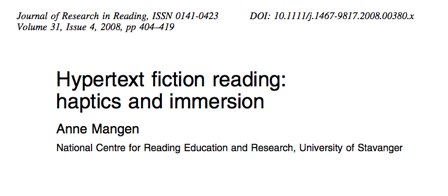Haptic Feedback
Stacey Mason

Anne Mangen explores how haptic responses shape our understanding of text. She’s interested in what we gain from physically touching a book.
Haptic perception is of vital importance to reading, and should be duly acknowledged. The reading process and experience of a digital text are greatly affected by the fact that we click and scroll, in contrast to tactilely richer experience when flipping through the pages of a print book. When reading digital texts, our haptic interaction with the text is experienced as taking place at an indeterminate distance from the actual text, whereas when reading print text we are physically and phenomenologically (and literally) in touch with the material substrate of the text itself.
The problem with this argument is that it makes assumptions about the virtues of haptic feedback, positing that some subconscious phenomenon occurs that shapes the reading experience when we physically touch a book. The physicality of the book does not bring us any “closer” to the materiality of the signified. We can’t rely on the assumption that the ability to touch or feel our content enriches it without an argument for why it does, and many of the current arguments can be explained by bad interfaces or other outside factors. Superficial arguments, like that haptic feedback signals to the reader where she is in a book, ignore the fact that much of this information can be easily mimicked by other technologies: completion percentage or a scrollbar with a “page x of y” display are now familiar substitutes for assessing how far one is in a story. How many of us really physically feel where we are in a story beyond the first and last few pages anyway?
Mangen isn’t just interested in ebooks; she writes of hypertext fiction:
In Narrative as Virtual Reality [Marie-Laure Ryan] concludes that ‘the hypertext format could provide the type of immersivity of the detective novel, as do some computer games, if it were based on a determinate and fully motivated plot’ […] I will argue, however, that when it comes to the (in)compatibility of digital technology with phenomenological immersion, plot is not the whole story. In my view, the incompatibility has at least as much, if not more, to do with the sensory-motor affordances of distinctly different materialities of technology than with plot.
(This explains why early stories like Esther and Ruth, which were designed for the sensory-motor affordances of the scroll, worked so poorly in the form of the codex book that they were soon forgotten. – MB)
I’m skeptical that haptic feedback is really at issue here. One can imagine a work in which tactile sensation is important (“words that yield” takes on a new meaning) but surely haptic feedback is not the only—or even most important—component. Do touch or—more broadly—mimetic sensations encourage more immersive experiences, or are other factors at play? How does agency contribute? It seems plausible that certain physical actions illicit Pavlovian conditioned emotional responses, but is there research to support such claims? Is touching an object, alone, enough to trigger such a response?
